沪教版六年级英语上册全册单元知识点
- 格式:doc
- 大小:75.50 KB
- 文档页数:17
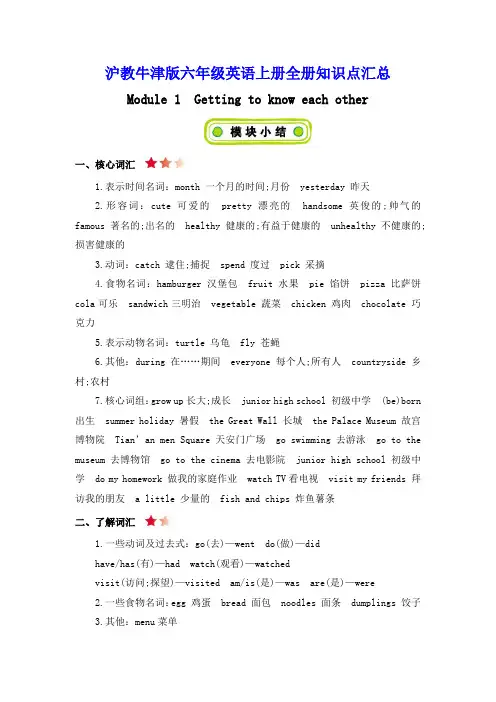
沪教牛津版六年级英语上册全册知识点汇总Module 1 Getting to know each other一、核心词汇1.表示时间名词:month 一个月的时间;月份yesterday 昨天2.形容词:cute 可爱的pretty 漂亮的handsome 英俊的;帅气的famous 著名的;出名的healthy 健康的;有益于健康的unhealthy 不健康的;损害健康的3.动词:catch 逮住;捕捉spend 度过pick 采摘4.食物名词:hamburger 汉堡包fruit 水果pie 馅饼pizza 比萨饼cola可乐sandwich三明治vegetable 蔬菜chicken 鸡肉chocolate 巧克力5.表示动物名词:turtle 乌龟fly 苍蝇6.其他:during 在……期间everyone 每个人;所有人countryside 乡村;农村7.核心词组:grow up长大;成长junior high school 初级中学(be)born 出生summer holiday 暑假the Great Wall 长城the Palace Museum 故宫博物院Tian’an men Square 天安门广场go swimming 去游泳go to the museum 去博物馆go to the cinema 去电影院junior high school 初级中学do my homework 做我的家庭作业watch TV看电视visit my friends 拜访我的朋友 a little 少量的fish and chips 炸鱼薯条二、了解词汇1.一些动词及过去式:go(去)—went do(做)—didhave/has(有)—had watch(观看)—watchedvisit(访问;探望)—visited am/is(是)—was are(是)—were2.一些食物名词:egg 鸡蛋bread 面包noodles 面条dumplings 饺子3.其他:menu菜单三、核心句型1.Her hair was short and her eyes were big. 她那时头发很短而且眼睛很大。
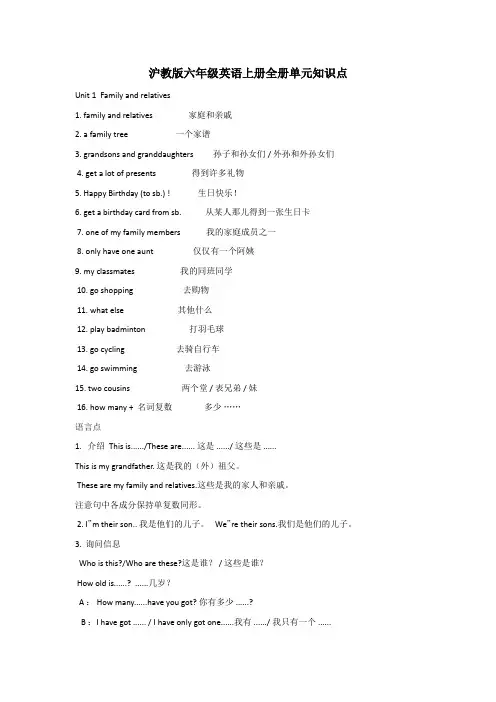
沪教版六年级英语上册全册单元知识点Unit 1 Family and relatives1. family and relatives 家庭和亲戚2. a family tree 一个家谱3. grandsons and granddaughters 孙子和孙女们 / 外孙和外孙女们4. get a lot of presents 得到许多礼物5. Happy Birthday (to sb.) ! 生日快乐!6. get a birthday card from sb. 从某人那儿得到一张生日卡7. one of my family members 我的家庭成员之一8. only have one aunt 仅仅有一个阿姨9. my classmates 我的同班同学10. go shopping 去购物11. what else 其他什么12. play badminton 打羽毛球13. go cycling 去骑自行车14. go swimming 去游泳15. two cousins 两个堂 / 表兄弟 / 妹16. how many + 名词复数多少……语言点1. 介绍 This is....../These are...... 这是 ....../ 这些是 ......This is my grandfather. 这是我的(外)祖父。
These are my family and relatives.这些是我的家人和亲戚。
注意句中各成分保持单复数同形。
2. I‟m their son.. 我是他们的儿子。
We‟re their sons.我们是他们的儿子。
3. 询问信息Who is this?/Who are these?这是谁? / 这些是谁?How old is......? ......几岁?A : How many......have you got? 你有多少 ......?B :I have got ...... / I have only got one......我有 ....../ 我只有一个 ......A : What do you usually do with your......? 你通常和你的 ...... 做......?B :I always/usually/sometimes/never do sth. with my......我总是 / 通常 / 有时候 / 从不和我的 ... 做 ...How many uncles do you have?你有多少个叔叔? How many 后面接可数名词的复数形式。
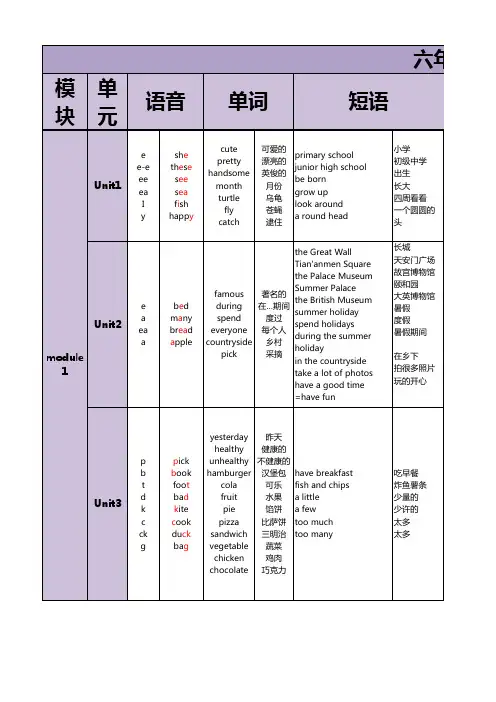
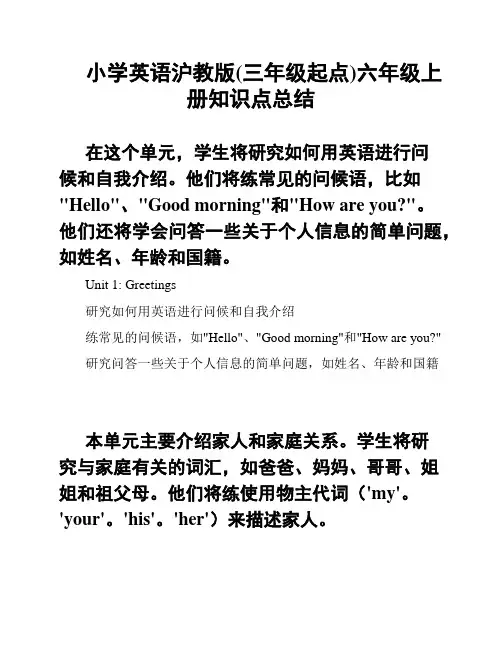
小学英语沪教版(三年级起点)六年级上册知识点总结在这个单元,学生将研究如何用英语进行问候和自我介绍。
他们将练常见的问候语,比如"Hello"、"Good morning"和"How are you?"。
他们还将学会问答一些关于个人信息的简单问题,如姓名、年龄和国籍。
Unit 1: Greetings研究如何用英语进行问候和自我介绍练常见的问候语,如"Hello"、"Good morning"和"How are you?"研究问答一些关于个人信息的简单问题,如姓名、年龄和国籍本单元主要介绍家人和家庭关系。
学生将研究与家庭有关的词汇,如爸爸、妈妈、哥哥、姐姐和祖父母。
他们将练使用物主代词('my'。
'your'。
'his'。
'her')来描述家人。
本单元中,学生将研究关于日常生活和时间表达的内容。
他们将研究与日常活动相关的词汇,如“起床”、“吃早餐”、“上学”和“做作业”。
他们将练使用一般现在时来谈论日常生活。
本单元介绍与食物和饮料相关的词汇。
学生将研究常见水果、蔬菜和饮料的名称。
他们将练使用诸如“I like”、“I don't like”和“Do you like?”等表达方式来谈论食物偏好。
在本单元中,学生将研究以下内容:研究并记忆常见水果的名称,如apple(苹果)、banana(香蕉)、orange(橙子)等。
研究并记忆常见蔬菜的名称,如carrot(胡萝卜)、tomato(西红柿)、cucumber(黄瓜)等。
研究并记忆一些常见饮料的名称,如milk(牛奶)、juice(果汁)、water(水)等。
练使用表达喜欢和不喜欢的句型,如“I like apples.”、“I don'tlike bananas.”等。
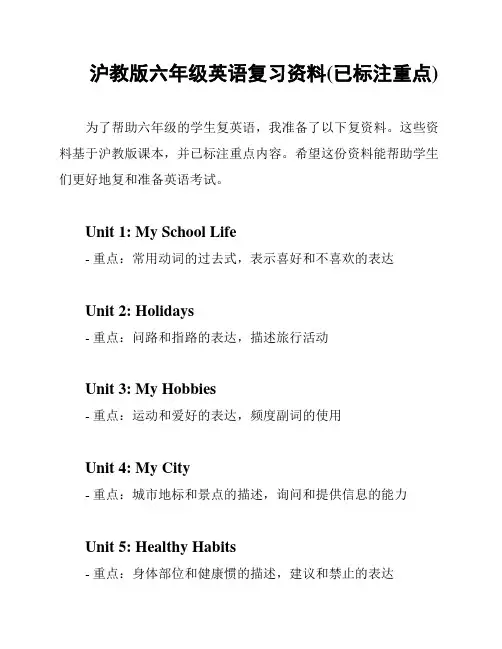
沪教版六年级英语复习资料(已标注重点)
为了帮助六年级的学生复英语,我准备了以下复资料。
这些资料基于沪教版课本,并已标注重点内容。
希望这份资料能帮助学生们更好地复和准备英语考试。
Unit 1: My School Life
- 重点:常用动词的过去式,表示喜好和不喜欢的表达
Unit 2: Holidays
- 重点:问路和指路的表达,描述旅行活动
Unit 3: My Hobbies
- 重点:运动和爱好的表达,频度副词的使用
Unit 4: My City
- 重点:城市地标和景点的描述,询问和提供信息的能力
Unit 5: Healthy Habits
- 重点:身体部位和健康惯的描述,建议和禁止的表达
Unit 6: At the Zoo
- 重点:描述动物的外貌和行为,询问和提供信息的能力
Unit 7: Food and Drinks
- 重点:食物和饮料的名称,句式“What do you want?”的用法
Unit 8: My Family
- 重点:家庭成员和关系的描述,家庭活动的表达
Unit 9: My Daily Routine
- 重点:日常活动的表达,日常时间的描述
Unit 10: Jobs
- 重点:职业名称和工作内容的描述,询问和回答关于职业的问题
以上是本复资料的主要内容。
希望学生们能通过复这些重点内容来巩固英语知识,取得优异的成绩。
祝大家研究愉快!
(注意:本文档内容仅供复习参考,具体考试内容以教材为准。
)。
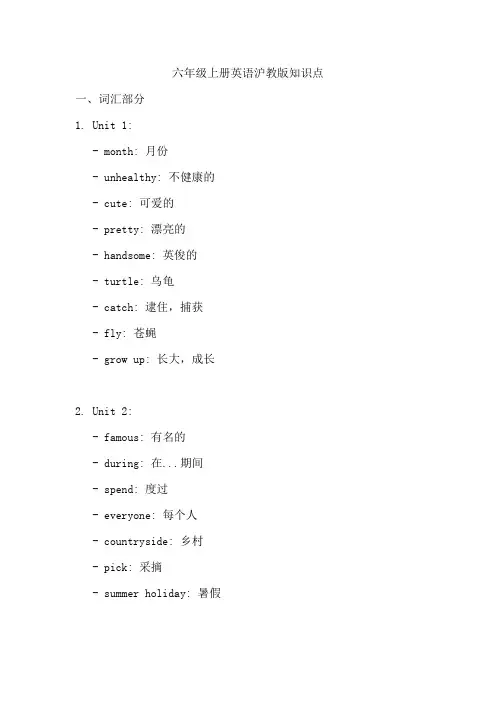
六年级上册英语沪教版知识点一、词汇部分1. Unit 1:- month: 月份- unhealthy: 不健康的- cute: 可爱的- pretty: 漂亮的- handsome: 英俊的- turtle: 乌龟- catch: 逮住,捕获- fly: 苍蝇- grow up: 长大,成长2. Unit 2:- famous: 有名的- during: 在...期间- spend: 度过- everyone: 每个人- countryside: 乡村- pick: 采摘- summer holiday: 暑假3. Unit 3:- healthy: 健康的- hamburger: 汉堡包- cola: 可乐- yesterday: 昨天- fruit: 水果- pie: 馅饼- pizza: 比萨饼- sandwich: 三明治- vegetable: 蔬菜- chicken: 鸡肉- chocolate: 巧克力- a little: 少许的4. Unit 4:- neighbor: 街坊- son: 儿子- daughter: 女儿- noisy: 喧华的- owl: 猫头鹰- dig: 挖(土);掘(洞) - make noise: 制造噪音5. Unit 5:- thousand: 一千- hundred: 一百- wild: 野生环境;野生的- South China tiger: 华南虎 - blue whale: 蓝鲸- way: 路;方式;方法- die: 死;死亡- rhino: 犀牛- learn: 学会;学习- send: 安排去;寄;送- in danger: 面对危险6. Unit 6:- e-friend: 网友- country: 国家- other: 其余的- team: (游戏或运动的)队 - hobby: 业余喜好- grade: 年级- yourself: 你自己- would like: (表示愿意、喜爱)二、语法部分- 疑问句词的学习:如what, when, where, who, whose, which, how 等,以及它们的用法和搭配。
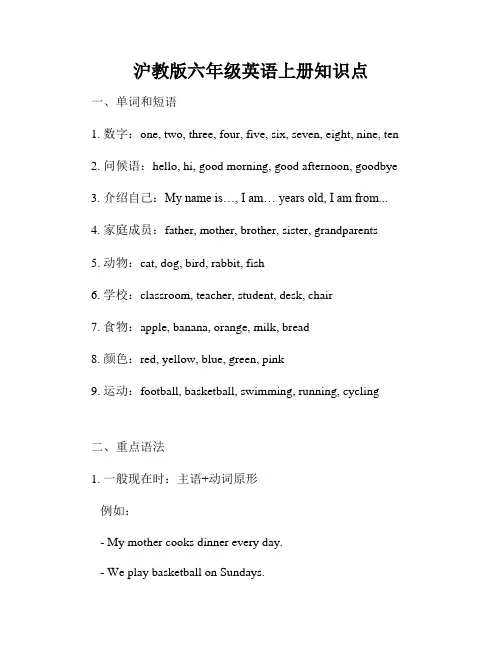
沪教版六年级英语上册知识点一、单词和短语1. 数字:one, two, three, four, five, six, seven, eight, nine, ten2. 问候语:hello, hi, good morning, good afternoon, goodbye3. 介绍自己:My name is…, I am… years old, I am from...4. 家庭成员:father, mother, brother, sister, grandparents5. 动物:cat, dog, bird, rabbit, fish6. 学校:classroom, teacher, student, desk, chair7. 食物:apple, banana, orange, milk, bread8. 颜色:red, yellow, blue, green, pink9. 运动:football, basketball, swimming, running, cycling二、重点语法1. 一般现在时:主语+动词原形例如:- My mother cooks dinner every day.- We play basketball on Sundays.- I like to eat apples.2. 情态动词 can 的用法:表示能力或许可例如:- I can swim in the pool.- Can you speak Chinese?- She can play the piano very well.3. 名词所有格的用法:'s 或'例如:- Tom's backpack is blue.- The dog's tail is wagging.- My parents' car is new.三、句型1. 问候语句- Hello, how are you?- Hi, good morning!- Good afternoon, nice to meet you.2. 自我介绍句- My name is Lisa. I am 11 years old.- I am from China.- I have one brother and one sister.3. 询问其他人情况- How old are you?- Where are you from?- Do you have any hobbies?4. 描述动物外貌特征- The cat is small and gray.- The dog has long ears.- The bird has colorful feathers.5. 谈论学校事物- Our classroom is clean and tidy.- The teacher is standing in front of the class. - The students are sitting at their desks.6. 询问食物偏好- What is your favorite food?- Do you like to eat bananas?- I prefer to drink milk.7. 描述颜色- The apple is red.- The banana is yellow.- The sky is blue.8. 谈论运动爱好- I like to play football.- She enjoys swimming in the pool.- They often run in the park.四、实用句型1. How do you do?(你好,很高兴认识你。
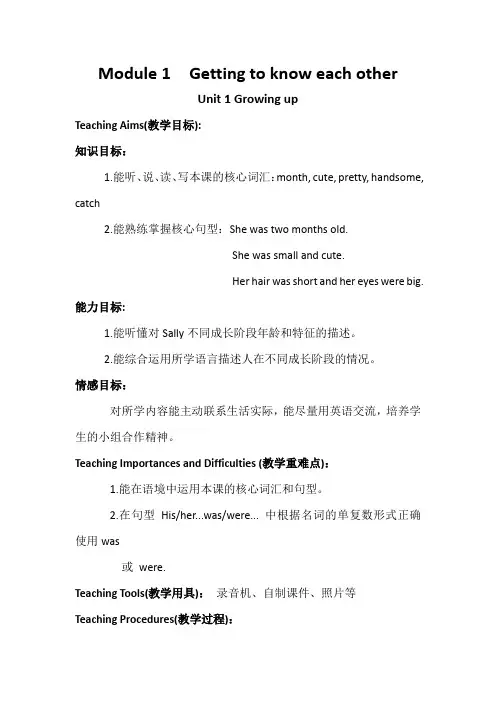
Module 1 Getting to know each otherUnit 1 Growing upTeaching Aims(教学目标):知识目标:1.能听、说、读、写本课的核心词汇:month, cute, pretty, handsome, catch2.能熟练掌握核心句型:She was two months old.She was small and cute.Her hair was short and her eyes were big.能力目标:1.能听懂对Sally不同成长阶段年龄和特征的描述。
2.能综合运用所学语言描述人在不同成长阶段的情况。
情感目标:对所学内容能主动联系生活实际,能尽量用英语交流,培养学生的小组合作精神。
Teaching Importances and Difficulties (教学重难点):1.能在语境中运用本课的核心词汇和句型。
2.在句型His/her...was/were... 中根据名词的单复数形式正确使用was或were.Teaching Tools(教学用具):录音机、自制课件、照片等Teaching Procedures(教学过程):StepⅠ.Warm up and revision(热身与复习)1. Greetings.2. Do some warming-up exercises.3. Review the numbers.Step Ⅱ.Presentation and practice(呈现新语言知识和练习)1. Lead in.T: How old are you?S1: I’m eleven years oldT: You’ll be twelve years old next year. You’re growing up.2. Show some photos and introduce the new words.3. Learn to say and use the words.4. Talk about the photos of Sally.5. Watch the screen and learn to say the sentences.6. Ask pupils to practise in groups.Sept Ⅲ. Learn the story (学习课文)1. Read the story and learn to say the useful sentences.2. Watch the cartoon.Module 1 Getting to know each otherUnit 2 My summer holidayTeaching Aims(教学目标):1.能听、说、读、写本课的核心词汇:famous, during, spend, everyone,countryside2.能熟练掌握核心句型:How was your summer holiday?It was wonderful. We went to the Great Wall.Everyone had a good time.3.读懂有关暑假生活的对话,学会询问别人和介绍自己的暑假生活。

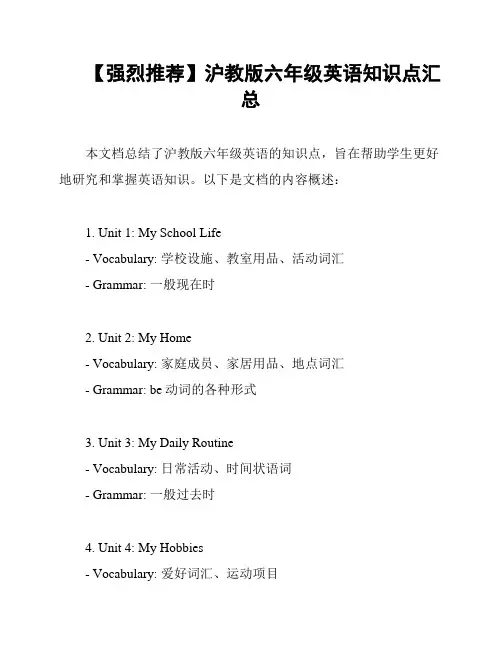
【强烈推荐】沪教版六年级英语知识点汇总本文档总结了沪教版六年级英语的知识点,旨在帮助学生更好地研究和掌握英语知识。
以下是文档的内容概述:1. Unit 1: My School Life- Vocabulary: 学校设施、教室用品、活动词汇- Grammar: 一般现在时2. Unit 2: My Home- Vocabulary: 家庭成员、家居用品、地点词汇- Grammar: be动词的各种形式3. Unit 3: My Daily Routine- Vocabulary: 日常活动、时间状语词- Grammar: 一般过去时4. Unit 4: My Hobbies- Vocabulary: 爱好词汇、运动项目- Grammar: can/can't进行能力描述5. Unit 5: Our Country- Vocabulary: 国家、人民、地理特点- Grammar: 形容词的比较级和最高级6. Unit 6: Festivals and Celebrations- Vocabulary: 节日、庆祝活动、食物词汇- Grammar: 一般将来时7. Unit 7: Our World- Vocabulary: 动物、自然界、环保词汇- Grammar: there be句型8. Unit 8: Out and About- Vocabulary: 交通工具、地点、方位词- Grammar: 同位语从句请注意,本文档是根据沪教版六年级英语教材编写的,旨在帮助学生回顾和复习课堂上学到的知识点。
具体的学习内容和练习题可以参考教材。
希望本文档能对学生的学习有所帮助!。
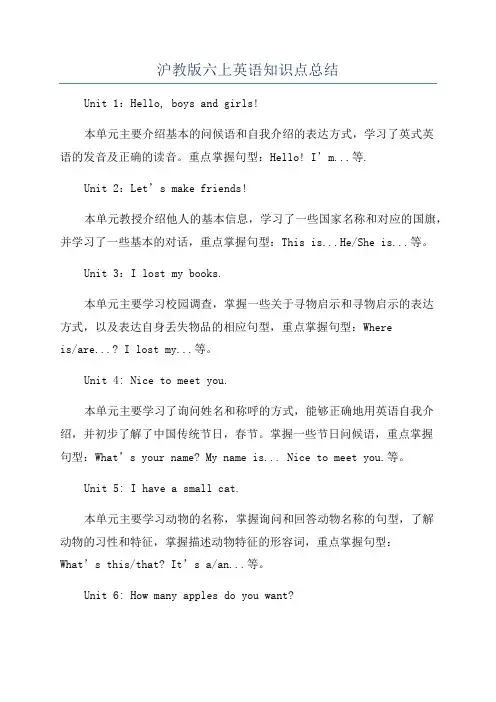
沪教版六上英语知识点总结Unit 1:Hello, boys and girls!本单元主要介绍基本的问候语和自我介绍的表达方式,学习了英式英语的发音及正确的读音。
重点掌握句型:Hello! I’m...等.Unit 2:Let’s make friends!本单元教授介绍他人的基本信息,学习了一些国家名称和对应的国旗,并学习了一些基本的对话,重点掌握句型:This is...He/She is...等。
Unit 3:I lost my books.本单元主要学习校园调查,掌握一些关于寻物启示和寻物启示的表达方式,以及表达自身丢失物品的相应句型,重点掌握句型:Whereis/are...? I lost my...等。
Unit 4: Nice to meet you.本单元主要学习了询问姓名和称呼的方式,能够正确地用英语自我介绍,并初步了解了中国传统节日,春节。
掌握一些节日问候语,重点掌握句型:What’s your name? My name is... Nice to meet you.等。
Unit 5: I have a small cat.本单元主要学习动物的名称,掌握询问和回答动物名称的句型,了解动物的习性和特征,掌握描述动物特征的形容词,重点掌握句型:What’s this/that? It’s a/an...等。
Unit 6: How many apples do you want?本单元主要学习数字1-100的表达方式,能够详细描述物品的数量,能够向他人询问需要的数量,重点掌握句型:How many...do you want?I want...等。
Unit 7: How much are these socks?本单元主要学习货币和购物的表达方式,能够向店员询问物品价格,并描述钱的数量,重点掌握句型:How much is/are...? It’s... Yuan.等。
Unit 8: What would you like?本单元主要学习点餐、介绍食物和饮料的名称,以及询问对其中一种食物和饮料的喜好程度,了解不同国家的饮食文化,重点掌握句型:What would you like? I’d like...等。
沪教版六年级英语上册-单元复习资料Unit 1- Vocabulary words: apple, banana, grape, orange, pear- Sentence structures:- "What fruit do you like? I like ___."- "What's this in English? It's an ___."Unit 2- Vocabulary words: book, eraser, pencil, pen, ruler- Sentence structures:- "What's this in English? It's a ___."- "Can I borrow a ___?"Unit 3- Vocabulary words: brother, father, grandmother, mother, sister - Sentence structures:- "Who's she? She's my ___."- "Do you have any ___?"Unit 4- Vocabulary words: cat, dog, fish, rabbit, turtle- Sentence structures:- "What's your favorite animal? My favorite animal is a ___."- "How many ___ do you have?"Unit 5- Vocabulary words: chicken, hamburger, pizza, rice, sandwich- Sentence structures:- "What do you want for lunch/dinner? I want ___."- "What's in the ___?"Unit 6- Vocabulary words: cloudy, rainy, snowy, sunny, windy- Sentence structures:- "What's the weather like today? It's ___."- "I like the ___ weather."这是一份沪教版六年级英语上册的单元复习资料,包括了每个单元中所学习的词汇和句式。
(完整word版)上海教育出版社六年英语上知识点.docUnit One Growing up一、补全单词并写出汉语1、m __ n __ h ______2、fl __ ________3、c __ t __h ________ ; _______4、t __ rtl __ ____________5、h __ nds __ me ________ ; ________ 、6pr __tt__ ______二、词组、句式1、长大、成长__________2、初级中学________________3、出生____________ 4、她的头发________ 5、在图 1 中 ____________ 6、baby (复数) ______ ,名词变复数规则之一,以 ____ + y 结尾的单词,将 y 变 ____再加上____ 7、两个月大__________ 8、又小又可爱______________ 9、She was small and cute. ________________ 10、small (反) ______ 11、 is(过去式) ____ ,am (过去式) ____ 12、(那时) 她的眼睛很大_____________13、old(反) ______ 14、 short (反 ) ______ 15、a primary school student__________ 16、Now she _____ (be) 14 years old , She ______ (go) to juniorhigh school . 17、junior high school __________ 18、pretty (同义词 ) _______19、Her hair ____ (be) long . 20、在河里____________ 21、black (反) ______22、look around ________ 23、He can find his mum . (否) _______________24、She _____ (have) a round head and a long tail . 25、fish (复 )________ 26、She has a tail . (否) ____________ . 27、she’s = ______ 28、I ’m in the room.______________ 29、fly (复 ) _____ 30、I am your mum . (一般疑问句,否回 )____________________ 31、抓苍蝇____________ 32、 In this photo, mysister ______ (be) one year old . 33、她的头发很短____________ 34、grow(现分) ________ 35、She is a baby .用(过去时改写) ____________ 36、She was about six years old . ( 否定句 ) ________________ . ( 一般疑 )________________Unit Two My summer holiday一、补全单词并写出汉语1、f __ m __ us ______ ; ______2、 d __ r __ __ __________3、sp __ nd________ 4、 __ v __ ry__ ne _______ ; _______ 5、 c __ untr __ s __ de________ ; ________ 6 、p __ ck ______ 7、 s __ mm __r h __ l __ d __ y________二、词组、句式1、fun (汉 ) ____;(形容词 ) ______2、拜访我的爷爷奶奶___________3、去海滩 _______ 4、go(过去式 ) _____ 5、和我的家人________ 6、there (同音词 ) ______ ;(对应词 ) ______ 7、玩球类游戏_____________ 8、去游泳___________ 9、在海里__________ 10、怎么样__________ . 11、Mysummer holiday was fun . ______________________ 12、I ____ (go) toBeijing yesterday. 13、长城_________ 14、天安门广场______________ 15、故宫博物院____________ 16 、take ( 过去式) ______ 17、拍许多照片__________ 18、I ’ll = ________ 19、 show you ________ 20、have(过去式)______ 21、You can see my photos.一(般疑 ) ____________ 22、during the summer holiday ______________ 23、在八月_________ 24、visit(过去式 )______ 25、去拿________ 26、乘飞机________ 27、英国(缩写) ______ 28、回到英国__________ 29、spend(过去式 ) ______ 30、在伦敦________ 31、they(物代 ) ___ 32、度过他们的假期____________ 33、She enjoyed her summer holiday. ____________ 34、过得开心、玩的愉快____________ 35、在农村__________ 36、摘苹果__________ 37、How was your summer holiday? I ________ (看电视 ),I ________ ( 去游泳), I ____________ ( 去博物馆), I __________ ( 去看电影), I ____________ ( 做作业 ), I ____________ (拜访朋友 ).Unit Three Healthy and unhealthy一、补全单词并写出汉语1、h __ __lth __ ______ ; ______2、 __ nh __ __ lth __ ______ ; ______3、h __ mb __ rg __ r ________ 4、c__ l __ ______ 5、y __ st __ rd__ y ________6、fr __ __ t ______7、p __ e ____8、p __ zz ______9、s __ndw __ ch ______10、 v __ g __ t __ bl __ ________ 11、ch __ ck __ n ________二、词组、句式1 、少量的 __________2 、炸鱼薯条____________3 、今天早晨____________ 4、吃早饭________ 5、I ____ (have) two apples yesterday.6、healthy (反 ) ________7、I had two hamburgers for breakfast. __________8、I had two hamburgers (否) ____________ 9、He had two hamburgers forbreakfast. ____________ 10、喝一些牛奶____________ 11、吃一些水果________ 12、吃少量的肉 ____________ 13、太多的肉____________ 14、What about you? ( 汉 ) ________ 15、I didn ’thave breakfast this morning.(肯) ______________ 16、吃午饭__________ 17、吃晚饭__________18、每天________ 19、一个鸡蛋和一个苹果________________ 20、Breakfast is important ____ us, I _____ (have) some bread and some _____ (milk) this morning, I also had an ______ and an apple. 21 、 Joe had two ______ and some cola, That is not ______. He should drink some ______ and eat some ______.22、sandwich (复) ________ 23、大量的米饭________ 24、吃一些鱼___________ 25、吃少量的甜食__________ 26、做运动__________ 27、又强壮又健康____________ 28、许多糖__________ 29、Lily and Bob play sports very often. 否( ) ______________ 30、 fat (反) ____ 31、健康的孩子们__________ 32、have poor eating habits ____________ 33、今天早上早餐你吃什么了?__________________ 我吃了一些面包,喝了一些牛奶________________ 34、喜欢吃饺子______________ 35、昨天,基蒂早餐喝了一些牛奶,吃了一些面包。
六年级沪教英语知识点汇总在六年级学习英语期间,我们将学习许多重要的知识点。
本文将对六年级沪教英语的知识点进行全面总结,以帮助同学们更好地掌握这些知识。
以下是本文的主要内容:Unit 1: My New Classroom在这个单元中,我们学习了描述教室和物品的词汇。
通过学习这些单词,我们能够准确地描述我们的教室环境,例如:desk (桌子)、blackboard(黑板)和bookshelf(书架)等。
此外,我们还学会了使用“There is”和“There are”句型来描述物品的位置。
Unit 2: Days of the Week这个单元我们学习了一周的天数。
我们通过歌曲和游戏记住了星期一到星期日的英文表达,并且能够用英语表达自己的日程安排。
通过这个单元的学习,我们不仅巩固了对数字的掌握,还学会了以英语进行日常生活的沟通。
Unit 3: Hobbies在这个单元中,我们学习了描述爱好和活动的词汇。
我们能够用英语表达我们喜欢的运动、音乐和游戏等。
通过这个单元的学习,我们培养了兴趣爱好,同时扩展了我们的词汇量。
Unit 4: Weather这个单元我们学习了描述天气的词汇。
我们能够用英语表达不同的天气情况,例如:sunny(晴天)、cloudy(多云)和rainy (下雨的)等。
通过学习这些词汇,我们可以更好地与他人讨论天气。
Unit 5: My Schoolbag在这个单元中,我们学习了描述学习用品和颜色的词汇。
我们能够用英语描述自己的书包和里面的物品,并且能够用颜色来形容这些物品。
这些知识对我们购物和日常生活非常有用。
Unit 6: The Environment这个单元我们学习了环境保护的重要性。
我们能够用英语表达保护环境的方法,并且理解环境污染对我们生活的影响。
通过学习这个单元,我们将更加关注环境问题,并积极参与环保行动。
Unit 7: Daily Routines在这个单元中,我们学习了描述日常活动的词汇。
沪教版六年级英语上一、单词部分。
1. 重点单词列举与记忆。
- 家庭成员相关。
- family(家庭;家族),例如:My family is big.(我的家庭很大。
)- father(父亲),口语中也可说dad,如:My father likes reading.(我爸爸喜欢阅读。
)- mother(母亲),口语中为mum或mom,例如:My mother is a teacher.(我妈妈是一名教师。
)- brother(兄弟),如:I have a younger brother.(我有一个弟弟。
)- sister(姐妹),例如:My sister is good at singing.(我姐姐擅长唱歌。
)- 学校相关。
- school(学校),例如:I go to school by bus.(我乘公共汽车去上学。
)- class(班级;课),如:We have an English class today.(我们今天有一节英语课。
)- teacher(教师),例如:Our teacher is very kind.(我们的老师非常和蔼。
)- student(学生),如:There are many students in our school.(我们学校有很多学生。
)- 日常用品相关。
- book(书),例如:I have a new book.(我有一本新书。
)- pen(钢笔),如:I write with a pen.(我用钢笔写字。
)- pencil(铅笔),例如:My pencil is short.(我的铅笔短了。
)- bag(书包),如:My bag is heavy.(我的书包很重。
)2. 单词的记忆方法。
- 制作单词卡片,一面写单词,一面写释义和例句,随时复习。
- 利用联想法,例如把“pen”(钢笔)联想成拿着钢笔写字的画面。
- 通过单词游戏,如猜单词游戏,一个人描述单词的意思,其他人猜单词。
上海教育版英语六年级上册单元重点Unit 1: My School Life- Vocabulary: classroom, teacher, student, desk, book, pen, pencil, ruler, eraser- Sentence structures:- I am a student.- This is my teacher.- I sit at my desk.- I have a book, a pen, a pencil and an eraser.Unit 2: My Family- Vocabulary: family, father, mother, brother, sister, grandfather, grandmother, uncle, aunt, cousin- Sentence structures:- This is my family.- My father is tall.- My mother is kind.- I have a brother and a sister.Unit 3: My Daily Routine- Vocabulary: get up, wash my face, brush my teeth, have breakfast, go to school, have lunch, do homework, play sports, have dinner, go to bed- Sentence structures:- I get up at 7 o'clock in the morning.- I wash my face and brush my teeth.- I have breakfast at 7:30.- I go to school at 8 o'clock.- I have lunch at noon.- I do my homework in the afternoon.- I play sports in the evening.- I have dinner at 6 o'clock.- I go to bed at 9 o'clock.Unit 4: My Hobbies- Vocabulary: hobby, read books, play games, draw pictures, listen to music, dance, sing songs, play an instrument- Sentence structures:- Reading books is my hobby.- I like playing games.- I can draw pictures.- I enjoy listening to music.- I love to dance.- I sing songs every day.- I can play the piano.Unit 5: My City- Vocabulary: city, park, library, museum, supermarket, hospital, school, restaurant, zoo- Sentence structures:- I live in a city.- There is a park near my house.- I visit the library often.- I love going to the museum.- We buy groceries at the supermarket.- If I get sick, I go to the hospital.- I study at a school.- We sometimes eat at a restaurant.- I like to see animals at the zoo.Unit 6: My Clothes- Vocabulary: clothes, hat, shirt, dress, pants, shoes, socks, jacket, coat- Sentence structures:- I wear clothes every day.- I have a red hat.- My shirt is blue.- I like wearing dresses.- I have black pants.- My shoes are white.- I always wear socks.- I have a green jacket.- In winter, I wear a coat.以上是上海教育版英语六年级上册单元的重点内容。
沪教版六年级英语上册全册单元知识点Unit 1 Family and relatives1. family and relatives 家庭和亲戚2. a family tree 一个家谱3. grandsons and granddaughters 孙子和孙女们 / 外孙和外孙女们4. get a lot of presents 得到许多礼物5. Happy Birthday (to sb.) ! 生日快乐!6. get a birthday card from sb. 从某人那儿得到一张生日卡7. one of my family members 我的家庭成员之一8. only have one aunt 仅仅有一个阿姨9. my classmates 我的同班同学10. go shopping 去购物11. what else 其他什么12. play badminton 打羽毛球13. go cycling 去骑自行车14. go swimming 去游泳15. two cousins 两个堂 / 表兄弟 / 妹16. how many + 名词复数多少……语言点1. 介绍 This is....../These are...... 这是 ....../ 这些是 ......This is my grandfather. 这是我的(外)祖父。
These are my family and relatives.这些是我的家人和亲戚。
注意句中各成分保持单复数同形。
2. I‟m their son.. 我是他们的儿子。
We‟re their sons.我们是他们的儿子。
3. 询问信息Who is this?/Who are these?这是谁? / 这些是谁?How old is......? ......几岁?A : How many......have you got? 你有多少 ......?B :I have got ...... / I have only got one......我有 ....../ 我只有一个 ......A : What do you usually do with your......? 你通常和你的 ...... 做......?B :I always/usually/sometimes/never do sth. with my......我总是 / 通常 / 有时候 / 从不和我的 ... 做 ...How many uncles do you have?你有多少个叔叔? How many 后面接可数名词的复数形式。
4. What do you do with your…?你和你的…干什么?5. What else do you do with your…?你和你的…还干什么?6. What else do you do with your…?你和你的…还干什么?With 是个介词,后面接人称代词时,要用宾格的形式。
With me/him/her/it/us /them 7. always/sometimes/usually 是频度副词,提问应该要用How often…?通常情况下常用于一般现在时态的句子中,表示经常发生的习惯性动作或自然现象或事实。
always 表示动作的重复频率最高,usually 其次, sometimes 再次, never 表示动作从未发生。
I often tell him about school.我经常告诉他关于学校的事。
I never show them my homework.我从未给他们看我的家庭作业。
8. 形容词比较级的用法:Your brother looks shorter than you.你的兄弟看上去比你矮。
Your uncle looks older than mine.你的叔叔看上去比我的叔叔年纪大。
9. look (连系动词) + adj. “看起来......” Jim looks happy today.Unit2I 词组 :1. talk to her: 和她谈话2. not…at all :一点也不,根本不3. go out at night:晚上出去4. like to be together :喜欢在一起5. walk to school :步行上学6. help each other :互相帮助7. help other people :帮助别人8. work hard :学习努力9. get angry :生气10. share her food with me:和我分享她的食物11. tell lies :撒谎12. live in the USA :住在美国13. for the first time :第一次14. on Saturday :在周六15. Friends of the Earth:地球之友16. look after the environment:保护环境17. pollute the environment :污染环境18. help keep the environment clean:帮助保持环境整洁19. pick up rubbish :捡起垃圾20. put rubbish into rubbish bins:把垃圾扔到垃圾箱里21. tell people not to leave rubbish:告诉人们不要丢垃圾II. 词性转换 :1.friend n. 朋友 friendly adj. 友好的* friendship n. 友谊2.help n./v. 帮助 helpful adj. 有帮助的 * helpless adj.无帮助的3.one 的序数词 first4.pollute v. 污染 pollution n. 污染5.discuss v. 讨论 *discussion n. 讨论e n. 用法,用处 v. 使用 useful adj. 有用的* reuse v. 再利用III. 语言点 / 句型1. I always talk to her. 和某人谈话:talk to sb. 谈论某事:talk about sth.和某人谈论某事:talk to sb. about sth. * 和某人交谈:talk with sb.e.g. Now my teacher is talking to Alice. Let’s talk about our plan for the trip.We can talk to our parents about the problem. *My uncle is very funny. I like to talk with him.2.But she doesn’t talk at all. not…at all: 一点也不Not at all: 不用谢,没关系e.g. 1) It isn’t clean at all.2)—Thank you very much. —Not at all.3. She likes to play.They like to be together.喜欢做某事:like to do sth.= like doing sth.e.g. He doesn’t like smoking.= He doesn’t like to smoke.4.She can’t read or write.肯定句中连接并列成分的and 变为否定句 , 要改成or e.g. She can sing and dance. 否定句: She can’t sing or dance.5.They walk to school together.步行上学:walk to school = go to school on foote.g. Ben walks to school every day.= Ben goes to school on foot every day.6.She always shares her food with me.和某人分享某物:share sth. with sb. e.g. Kitty shares a room with her sister.I like to share the good time with my good friends.7.They help each other. 互相帮助:help each other 相爱:love each other互相学习:learn from each othere.g. My father and mother love each other.We should help each other and learn from each other.8. She always works hard.努力工作:work hard= be hardworkinge.g. My teacher always works hard. =My teacher is always hardworking.9.She never tells lies. 撒谎:tell a lie = tell liese.g. Tom isn’t honest. He usually tells lies.=He usually tells a lie.10.Kitty’s cousin lives in the USA . 居住在某地:live in sp. 美国: the USA=Americae.g. She lives in Rose Garden Estate.11.Kitty and Alice are asking Winne about where she has been in Garden City.向某人询问某事:ask sb. about sth. e.g. Don’t ask me about my salary.12.I’m going there on Saturday.在星期几和具体日期前要用介词 one.g. Let’s go to have a barbecue on Sunday.13.Kitty: Have you been to Ocean Park yet, Winne?Winne:No, I haven’t been to Ocean Park yet.Alice:Have you been to Garden City Zoo yet?Winne: Yes, I’ve just been to Garden City Zoo.Kitty: Have you been to North City Park yet?Winne:Yes, I’ve already been there.have/has been to sp. 去过某地1). 经常和 already( 已经 ) , just (刚), yet (还)连用already :“已经”,用于肯定句中( have/has 之后) just: “刚”,用于肯定句( have/has 之后)yet:“尚,还”,用于否定句和一般疑问句句末2). 否定式: haven’t /hasn’t been to sp.一般疑问式:直接将 have/ has 提到句首回答:Yes, …have/has. No, …haven’t/hasn’t.3). 当 sp. 是here, there 或 home 时, to 要省略e.g. I have already been to Beijing . I haven’t been to Beijing yet. Have you been to Beijing yet? No, I haven’t been there.14.What about Water World?What about…? 经常用于表示征求建议,表示“…怎么样?”“…呢?”用法: what about+ n./V.ing = How about + n. / V.inge.g. What about a trip to City Park? =How about a trip to City Park ?What about going to City Park? =How about going to City Park ?15.Friends of the Earth look after the environment.照顾,照看:look after=take care of好好照顾某人:look after sb. well = take good care of sb.16.Friends of the Earth help keep the environment clean.帮助某人做某事:help sb. (to) do sth.= help sb. with sth.e.g.He helps me (to) learn English. =He helps me with my English.17.They put rubbish into rubbish bins and tell people not to leave rubbish.告诉某人做某事:tell sb. to do sth.告诉某人不要做某事:tell sb. not to do sth.e.g.The teacher tells us not to tell lies.The teacher tells us to listen carefully in class.18.What do you promise todo? What do you promise not to do?I promise to keep our school clean. I promise not to leave rubbish.承诺做某事:promise to do sth.承诺不要做某事:promise not to do sth. e.g. My father promises not to smoke. We promise to obey the rules.19.Discuss it with your classmates.和某人讨论某事:discuss sth.with sb.e.g. I always discuss the maths problems with my classmates.Unit 3 Spending a day out together1. spend a day out together 一起在外度过一天 .spend v. 花费 spending n. 开销,花费 spend a day out 花一天时间外出2. on Green Island 在绿岛上island n. 岛屿on Lucky Island 在幸运岛上 lucky a. 幸运的luck n. 运气 luckily ad. 幸运地 unlucky a. 不幸的 unluckily ad. 不幸地3. in Happy Town 在快乐城4. in Dragon Bay 在龙湾 bay n. 海湾dragon n. 龙 dragon boat 龙舟5. on Lucky Island / in Sandy Bay / in Happy Town/ at the seaside不同的地点前使用不同的介词6. at weekends = at the weekend =on Saturday or Sunday 在周末weekend n. 周末 weekday n. 工作日 at weekends 在周末 on weekdays 在工作日7. be near sp. 离开某地近的8. be far (away) from sp 离开某地远的9. Seaside Town 海边镇 seaside n. 海滨 seashore n. 海岸,海滨10. a photo of my family and me 一张我家人和我的照片11. have lunch together 一起吃午饭12. Green Market 格林市场13. In Sunny Town 在太阳城14. Space Museum 太空博物馆space n. 空间 spacious a. 宽敞的15. In Moon Town 在月亮城16. an activity 一项活动activity n. 活动 act n./v. 行为,活动 actor n. 男演员 actress n. 女演员17. have a barbecue 进行一次烧烤18. fly kites 放风筝 19. ride bicycles 骑自行车20. make sandcastles 筑沙堡21. collect shells 收集贝壳 collect v. 收集 collection n. 收集,收集的东西22. make an album 制作一本照片簿album n. 相册,唱片photo album 相册23. plan to do sth. 计划做某事24. a good idea 一个好主意25. which place 哪一个地方26. plan a trip 计划一次旅行27. How about………怎么样?(常用于表示建议或提议)28. be going to + v. 打算做…29. a.m. = in the morning p.m. = inthe afternoon一、重点词汇和短语:1. plan to do sth 计划去做某事,与 be going to do sth 的意思相近e.g. I plan to visit my grandma this Sunday = I am going to visit my grandma.我打算这个星期天去看望我的外婆。